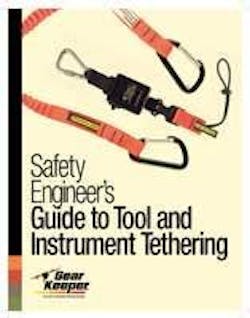Safety Engineer’s Guide to Tool and Instrument Tethering
The guide’s “Select the Right Tether in Four Easy Steps” chart is designed as a quick reference that will aid safety professionals when selecting appropriate tethers for tools up to 25 pounds. Also covered in the guide are workplace considerations such as; tethers for working in confined quarters or climbing; tethers that allow for quick interchangeability of tools; when is it mandatory to anchor the tether to a structure instead of a person; choosing tethers that reduce worker’s fatigue and what safety engineers need to know about load-testing and built-in safety margins for tethers.
The “Industrial Tool Tether” section includes an X/Y chart that helps safety engineers quickly match tether and lanyard model numbers to tool weight and usage. With over 3,000 tethering configurations available, the guide highlights many of Gear Keeper’s most popular tethers and lanyards. For safety engineers concerned with the safety and protection of hand-held instruments such as bar code readers, the “Instrumentation Tether” section covers a range of tethering options. Among the unique tether configurations described is a shoulder strap tether that offers an exclusive “Instrument Slide” feature that permits instrument movement on the strap without the strap moving on the worker’s body. Even how to tether other workplace objects such as hard hats, security cards, cell phones and micro-tools are covered in the guide. Information is also included about tethering seemingly “untetherable” tools and how to create custom tethers for unique applications.
